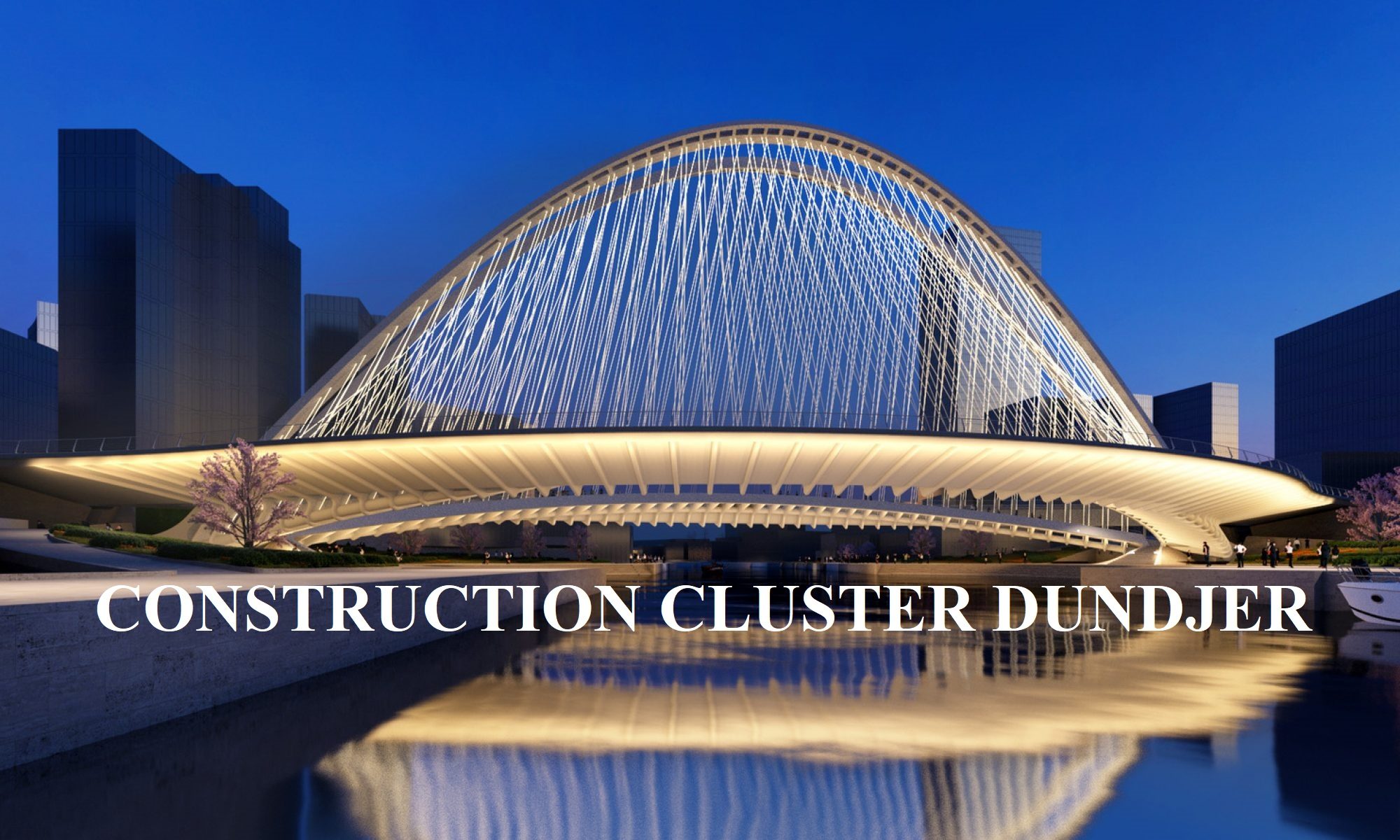Građevinski klaster DUNĐER u okviru projekta ADRIATIC DANUBIAN CLUSTERING (ADC) učestvovao na dvodnevnom sastanku u Mariboru od 31.05.2011. do 01.06.2011. i potpisao sporazum o formiranju transnacionalnog klastera u oblasti Modern Housing.

The construction cluster DUNĐER within the project ADRIATIC DANUBIAN CLUSTERING (ADC) participated in a two-day meeting in Maribor from 31.05.2011. until 01.06.2011. and signed an agreement on the formation of a transnational cluster in the field of Modern Housing.
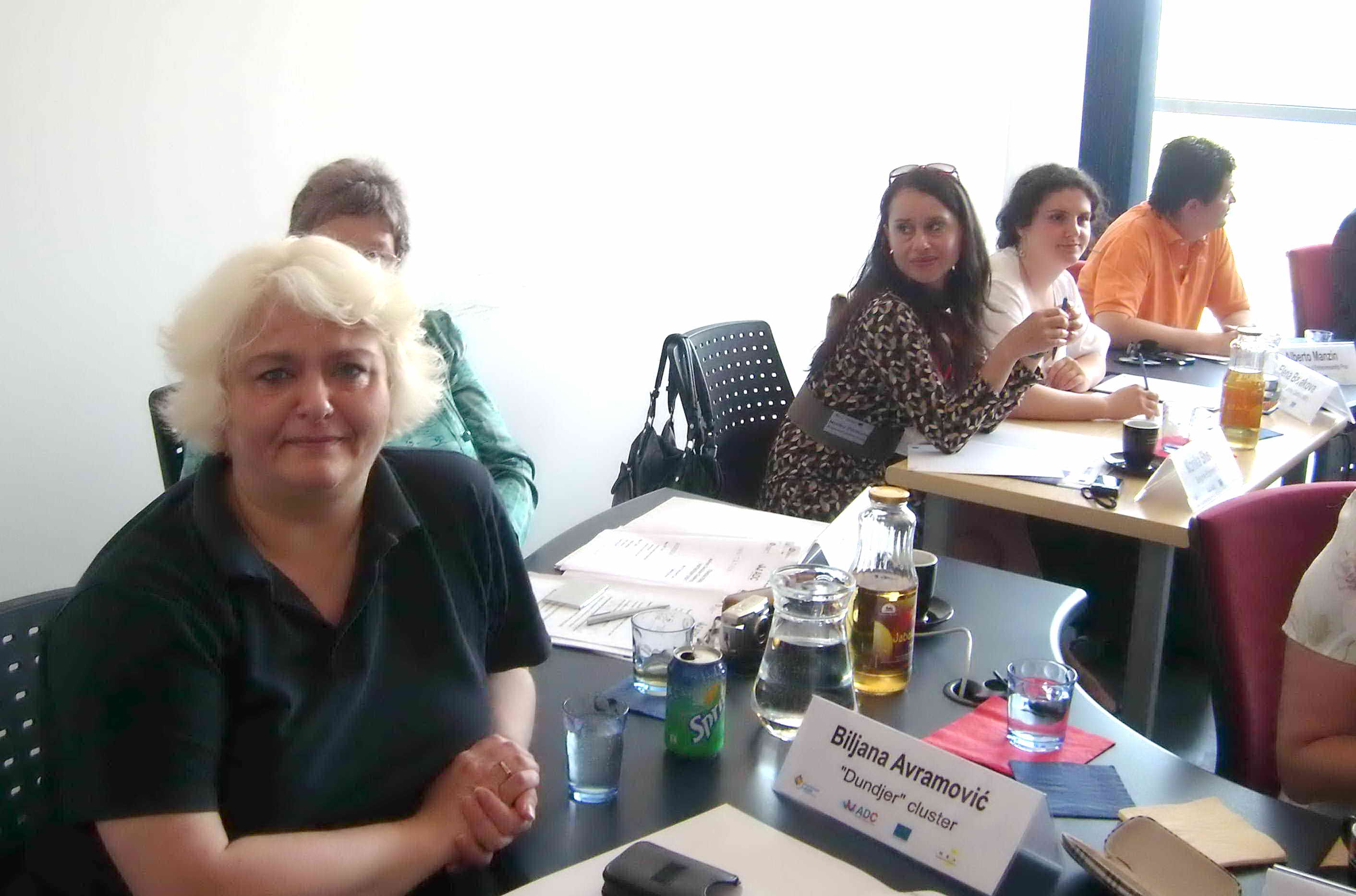

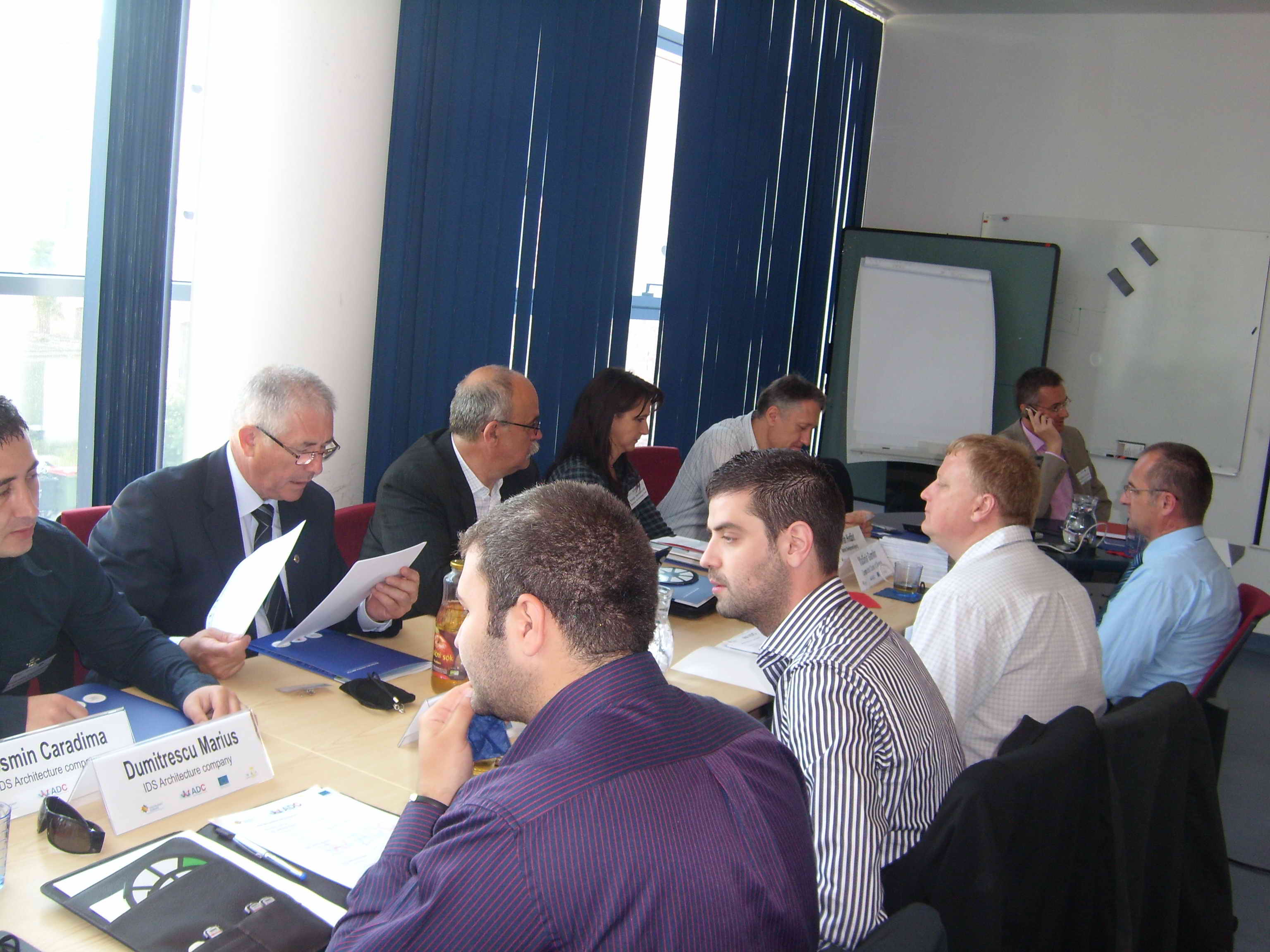
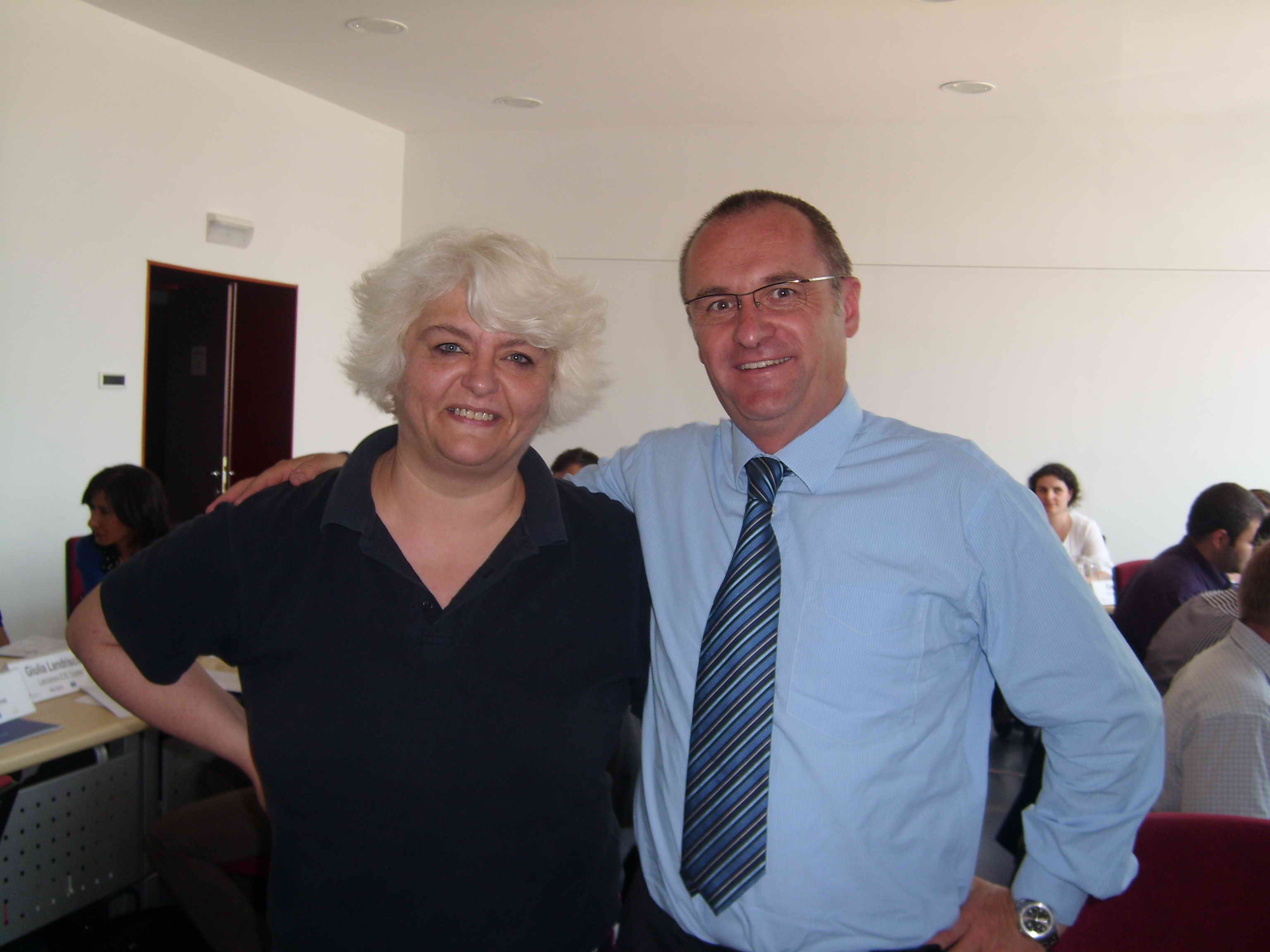
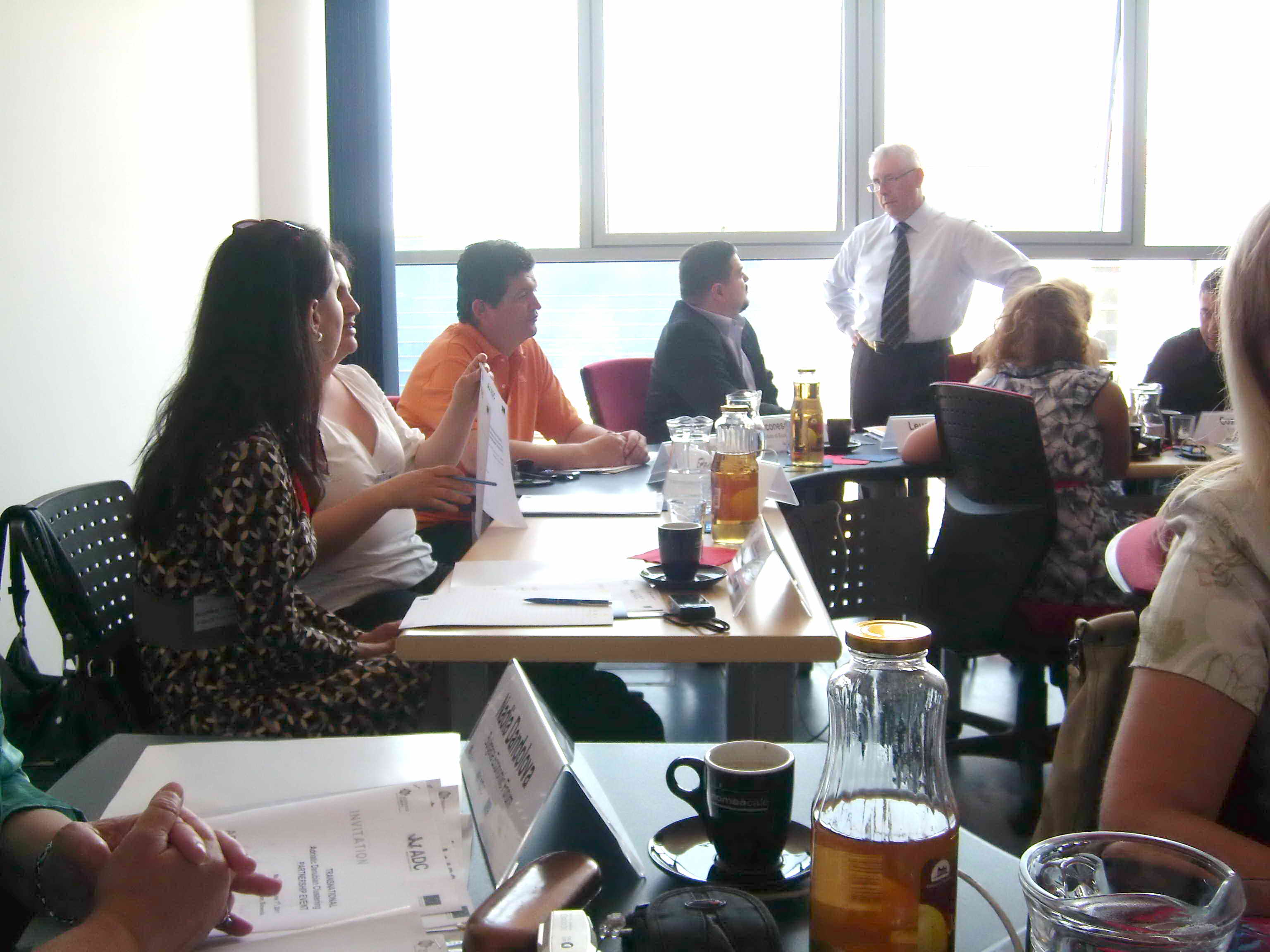
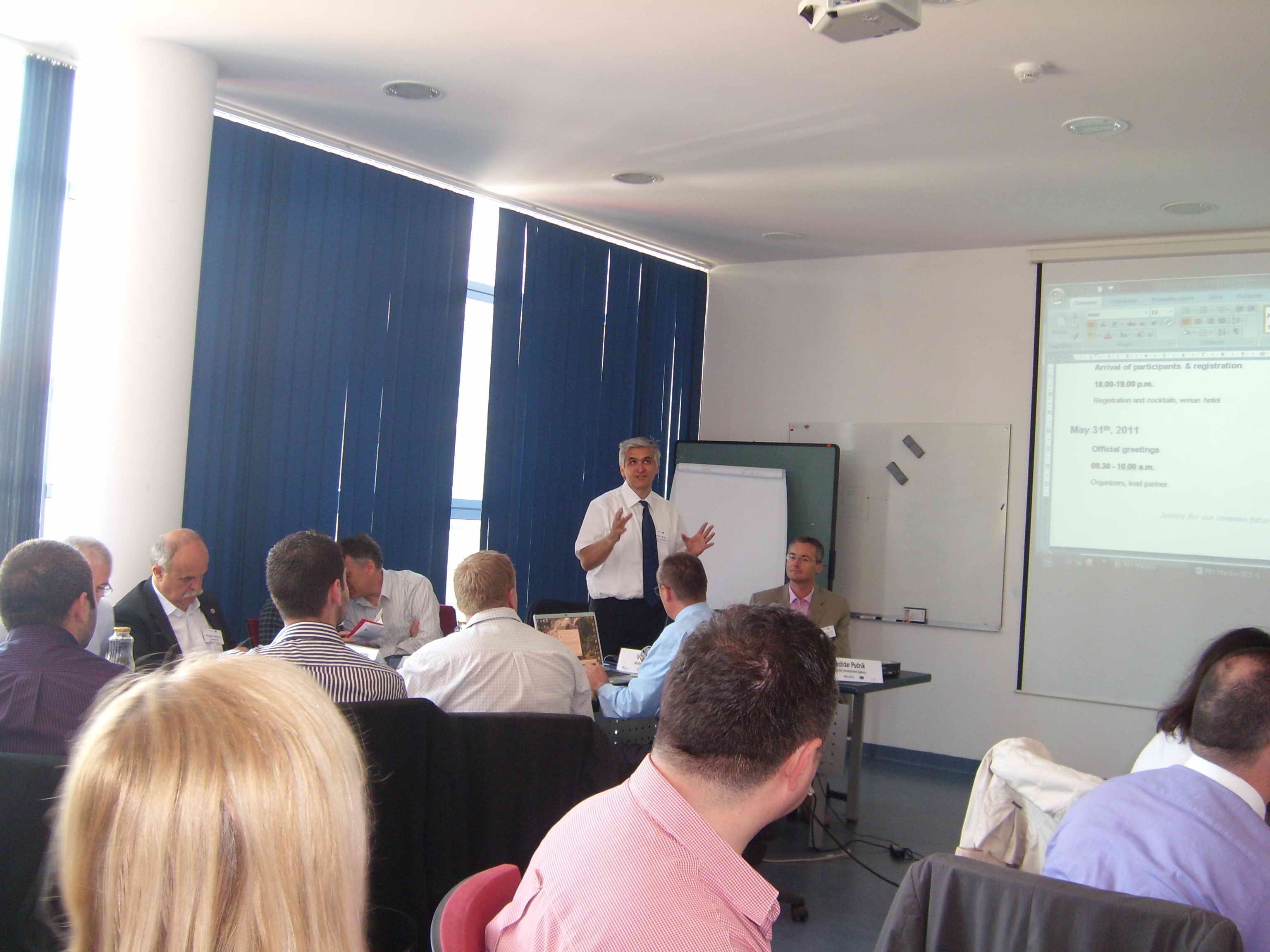

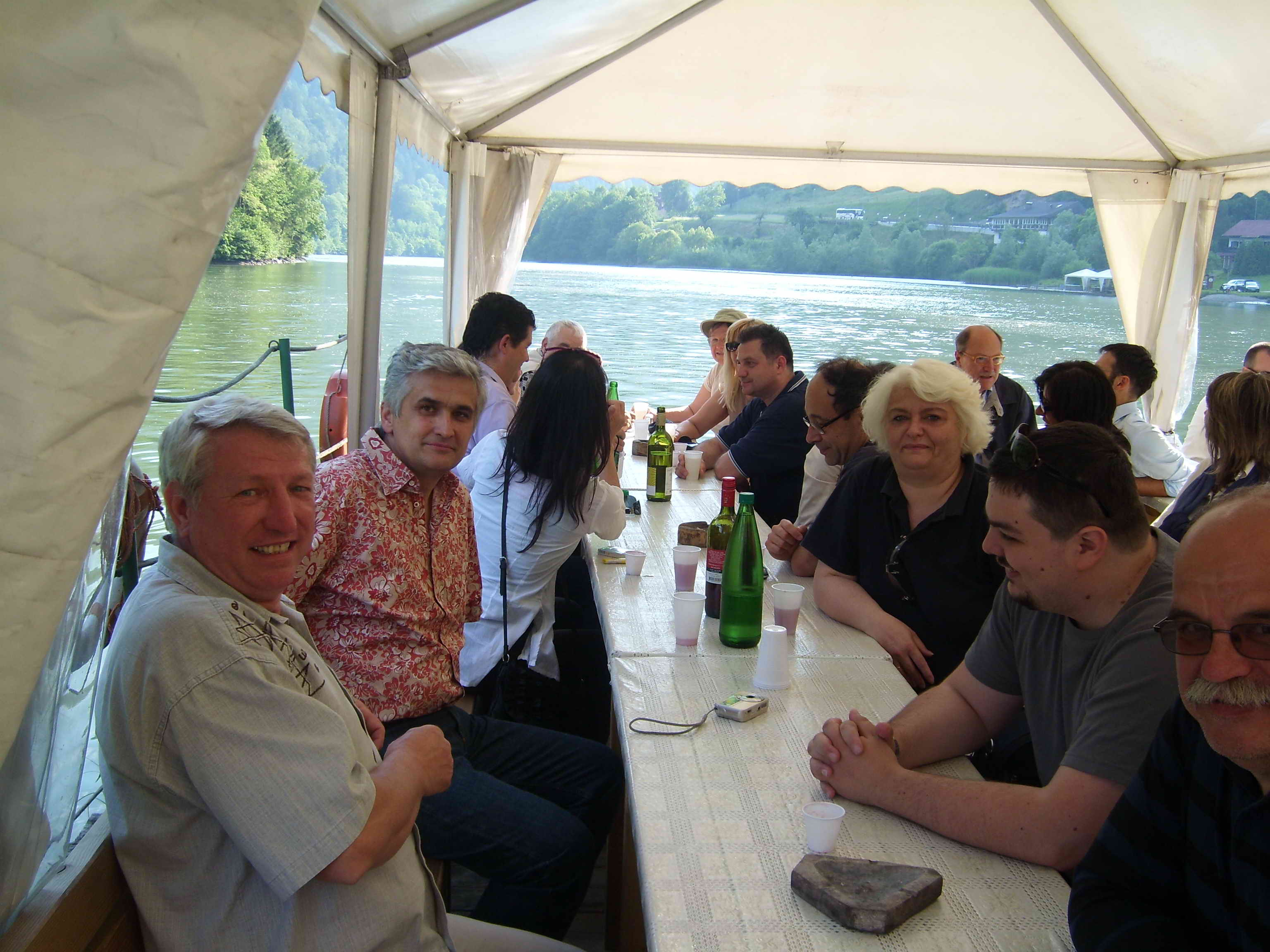
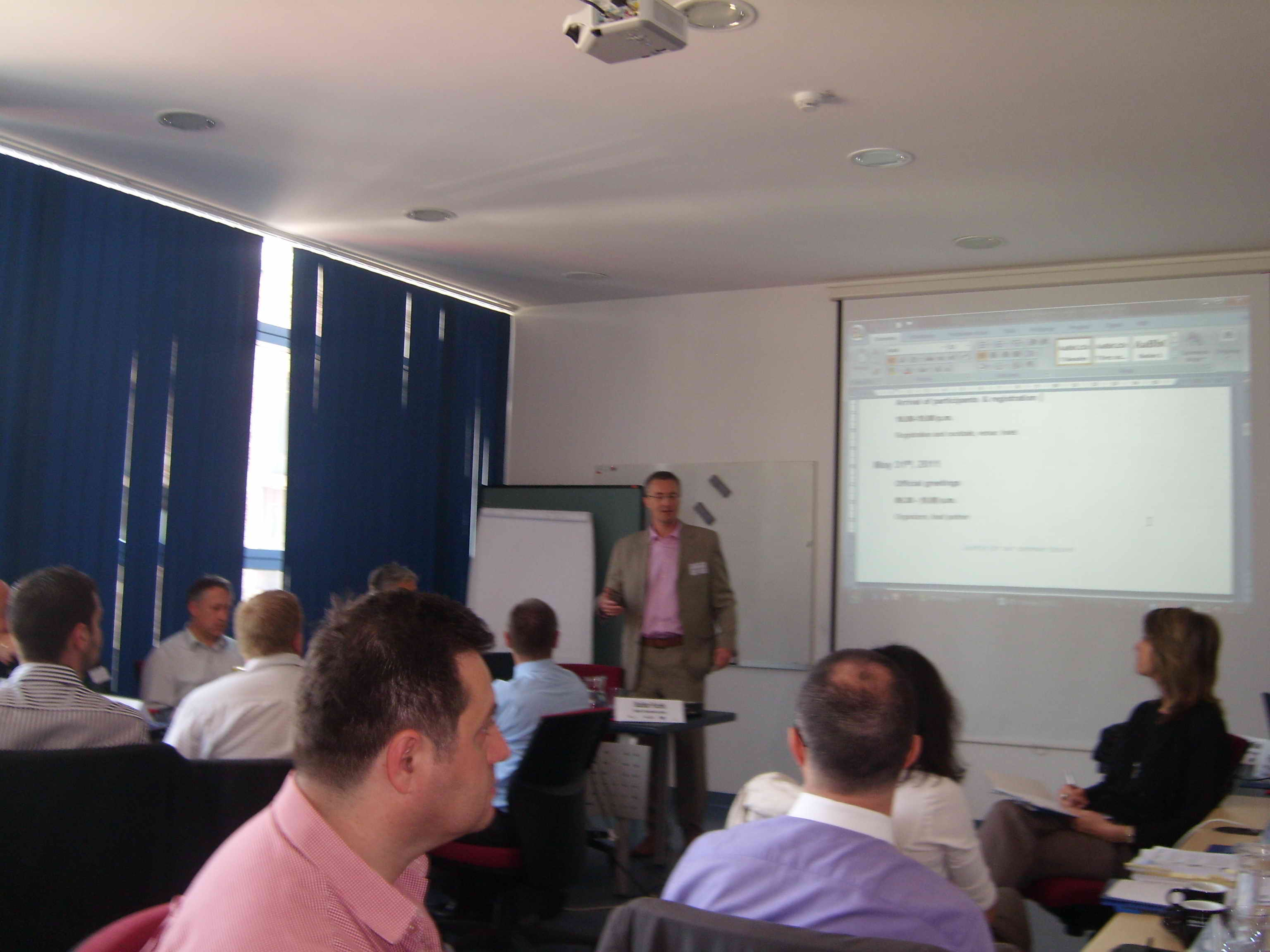
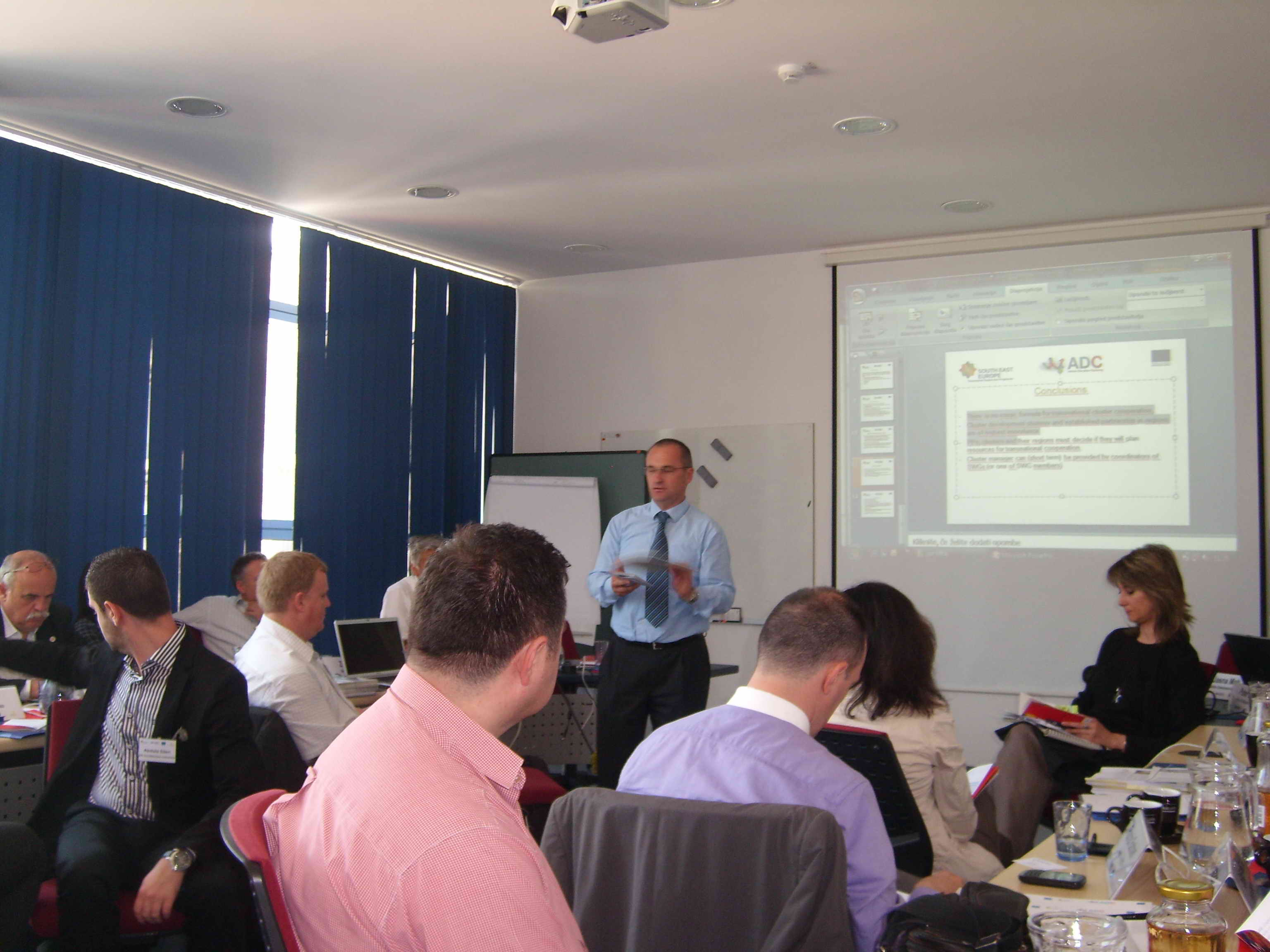
ADC Projekat – WP4 – SWG Moderno stanovanje
ADC TRANSNACIONALNI SPORAZUM ZA KLASTERING U MODERNOM STANOVANJU
Mi, partnerske organizacije projekta “Jadransko-dunavski klastering – ADC” (www.adcproject.eu ), finansiranog iz Evropskog operativnog programa za Jugoistočnu Evropu 2007-2013 (OP SEE) smo, zajedno sa dole potpisanim stejkholderima:
Potpuno svesni značaja klastera kao geografskih aglomeracija (na lokalnom, regionalnom i nacionalnom nivou) kompanija, snabdevača, pružaoca usluga i povezanih institucija u određenim oblastima, vezanih spoljašnjim činiocima i komplementarnostima različitih tipova;
Imajući u vidu opšti cilj ADC projekta koji je stvaranje efikasnih transnacionalnih mreža između proizvodnih klastera privrednog sektora od strateškog značaja za naše zemlje, sa modernim stanovanjem kao jednim od njih;
Uzimajući u obzir Završne preporuke Evropske grupe za klaster politiku – ECPG (septembar 2010) u kojima se naglašava potreba kombinovanja reakcije na makro ekonomsku politiku sa strukturnim podizanjem konkurentnosti u skladu sa ambicijama strategije Evropa 2020 i sve većim značajem klastera u novom globalnom okruženju iz koga ova stategija mora da sledi;
Imajući posebno u vidu poziv ECPG-a za preuzimanje obaveza evropskih kreatora politike prema aktivnoj podršci potencijalu klastera u modernizaciji i poboljšanju ekonomskih politika, počevši od osnovne crte međunarodne saradnje između klastera radi razvoja novih industrija/usluga, usavršavanja veština klasterskih organizacija i radi boljeg slaganja javnih instrumenata i upravljanja klasterima (na primer programiranjem fondova za ruralni i regionalni razvoj),
Imajući u vidu najnovije EU politike i EC preporuke koje se tiču dostignuća strategije Europe 2020, a posebno EPBD prerađenu verziju (Direktiva 2010/31/EU, novembar 2009) u kome se navodi da svi novi objekti širom EU treba da budu “skoro” nula potrošači-energije do 2020.
Uzimajući u obzir zeleni papir o modernizaciji EU politike javnih nabavki “Ka efikasnijem evropskom tržištu nabavki” (COM (2011) 15 final) u kome se radi o reformi propisa o javnim nabavkama uz naglašavanje ključnog pravila da javna nabavka mora da ima ulogu u rezultatima strategije Europe 2020, posebno u delu koji se tiče promocije “Zelene javne nabavke”.
Budući da ADC projekat ima za cilj:
- da ostvari transnacionalnu konkurentnu saradnju između preduzeća radi prevazilaženja nedostatka uzajamnog znanja o mogućnostima preduzetničke saradnje kada se radi o pristupu inovacijama, razvoju ljudskog kapitala, razmeni lanca snabdevanja, faznoj specijalizaciji i zajedničkim inicijativama na svetskom tržištu;
- da bolje iskoristi proizvodne veštine SEE regiona i lokacijski zasnovane implementacije višeslojnog upravljanja za jačanje kapaciteta privlačnosti Jadransko-dunavske oblasti kao integrisanog proizvodnog sistema sa visokom konkurentnošću za međunarodne investitore;
- da promoviše evoluciju ADC Sektorske radne grupe o modernom stanovanju, zasnovane na lokalnim fokus grupama u partnerskim oblastima koje grade nove transnacionalne veze između stejkholdera i kompanija postojećih i novih klastera i/ili mreža kompanija;
- da stvori održivo, stalno, transnacionalno partnerstvo oblikujući nove Jadransko-dunavske klastere modernog stanovanja koji okupljaju proizvodne i uslužne kompanije u podsektoru održivog građevinarstva, obnovljive energije, tehnologije uštede energije u izgradnji, kao i automatizaciju kuća, svetlosni inženjering, drvo i nameštaj, restauraciju;
- svi gornji navodi smatraju se sastavnim delom ovog sporazuma;
saglasni smo sa
Član 1 – Misija mreže transnacionalnih klastera za Moderno stanovanje
Uspostavljanje mreže Jadransko-dunavskih klastera modernog stanovanja ima za cilj da ispuni ičekivanja i da se uskladi sa interesima za rast klastera modernog stanovanja i mreža kompanija, njihovih stejkholdera i kompanija koje su u tome pružajući olakšice u
- formiranju stalnih novih trgovinskih veza u zemljama Jugoistočne Evrope;
- boljoj vidljivosti SEE klastera i novih klastera radi razmene dobrih praksi, posebno u oblasti poboljšanja standarda kvaliteta i jačanja održivih proizvodnih tehnika;
- pristupu i korišćenju Usluga zasnovanih na znanju (KBS);
- promociji SEE sistema prenosa tehnologije za bolju razmenu inovacionih izvora i RTD rezultata u sektoru modernog stanovanja;
- boljim izvozno & uvoznim vezama standardizovanih proizvoda između internog tržišta i ACs, a posebno CEFTA-e;
- međusektorsko poklapanje između potencijalnih partnera različitih specijalizacija, kao i njihova saradnja na međunarodnom tržištu;
- zajedničkom učešću u projektima koje finansira /sufinansira EU i drugi donatori.
Član 2 – Principi transnacionalne saradnje
U implementaciji misije, Jadransko-dunavski klaster modernog stanovanja pokreću tri pretpostavke o identitetu i opravdanosti transnacionalne saradnje u sektoru modernog stanovanja:
- da se doprinese integraciji lanca snabdevanja;
- da se popravi proces poverenja među kompanijama;
- da se ojača državno ulaganje u održive (zelene) kuće kroz javno-privatno partnerstvo
- da se doprinese rezultatima strategije Europe 2020 kroz jačanje i pobiljšavanje vrednosnog lanca modernog stanovanja.
Pored toga ADMHC promoviše direktne inicijative za edukaciju i podizanje svesti krajnjih korisnika.
Član 3 – Specifični ciljevi
Za promociju klasteringa kompanija za modernog stanovanja i potpornih organizacija na transnacionalnom nivou u SEE Jadransko-dunavski klaster modernog stanovanja (ADMHC) posebnu pažnju poklanja:
- prenosu know-how-a i razmeni najboljih praksi;
- obezbeđivanju tehničke edukacije i celoživotnog učenja o održivoj izgradnji i kvalitetu radi stalnog razvijanja ljudskog kapitala u ovom sektoru, kao i kroz mogućnosti razmene osoblja;
- jačanju procesa međusobnog poverenja među kompanijama u sektoru da bi se ojačale veze u SEE regionu;
- svesti o značaju stalnih inovativnih procesa i funkcionisanju proaktivnih sistema prenosa tehnologije;
- svesti javnih donosioca odluka o politici podrške održivim zgradama zasnovanoj na zajedničkom struktuiranju investicionih planova/javno-privatnom partnerstvu;
- poboljšanju ekološke održivosti građevinske industrije.
Član 4 – Upravljanje
Mere predviđene ovim sporazumom predmet su zajedničkog obavezivanja u primeni potpisivanjem od strane ADC projektog partnera i stejkoldera potpisnika (predstavnici klastera, RTD – Univerziteti – Inovacioni centri, Komore i ostali akteri razvoja, uključujući finansijske institucije, Regionalne i lokalne upravne organe) i kompanije voljne da postanu vlasnici procesa umrežavanja u Jadransko-dunavski klaster modernog stanovanja.
Prioritetni zadatak ovog partnerstva je osnivanje efikasne i održive jedinice za funkcionisanje mreže oblikujući transnacionalnu dimenziju ADMHCN-a i nakon završetka projekta.
Njegovim izvršenjem, partnerstvo će voditi računa o podsektorskom usklađivanju proizvodnih specijalnosti u domenu održive izgradnje, obnovljive energije, tehnologije uštede energije u građevinarstvu i automatizaciji kuća, svetlosnom inženjeringu, drvetu i nameštaju, restauraciji.
Pored toga menadžment ADMHCN-a će primeniti otvoren stav prema prijemu novih članova, posebno novih klaster lidera, kao i prema proširenju na druge aktivnosti vezane za građevinsku industriju.
Umrežavanje sa drugim međunarodnim mrežama od značaja za razvoj i efektivnost ADMHCN-a je takođe poželjno.
Građevinski klaster DUNDJER Gradonačelnik Niša
ADC Project – WP4 – SWG Modern housing
ADC TRANSNATIONAL CONTRACT FOR CLUSTING IN MODERN HOUSING
We, the partner organizations of the project “Adriatic-Danube Clustering – ADC” (www.adcproject.eu), financed by the European Operational Program for South-East Europe 2007-2013 (OP SEE), together with the below-mentioned stakeholders:
Fully aware of the importance of clusters as geographical agglomerations (at local, regional and national level) of companies, suppliers, service providers and related institutions in certain areas related to external factors and complementarities of different types;
Bearing in mind the overall goal of the ADC project is to create efficient transnational networks between productive clusters of the economic sector of strategic importance for our countries with modern housing as one of them;
Taking into account the Final Recommendations of the European Cluster Policy Group – ECPG (September 2010), which emphasize the need to combine a response to macroeconomic policies with a structural increase in competitiveness in line with the ambitions of the Europe 2020 strategy and the growing importance of clusters in the new global environment from which this the strategy must follow;
Having in mind, in particular, the ECPG’s call to take over the obligations of European policy makers towards actively supporting the cluster’s potential in modernizing and improving economic policies, starting with the basic cluster of international cluster cooperation for the development of new industries / services, improving skills of cluster organizations and for better understanding of public instruments and cluster management (for example, programming of funds for rural and regional development),
Bearing in mind the latest EU policy and EC recommendations concerning the achievements of the Europe 2020 strategy, and in particular the EPBD revised version (Directive 2010/31 / EU, November 2009) stating that all new facilities across the EU should be “almost” zero Consumers-Energy by 2020
Taking into account the green paper on the modernization of the EU public procurement policy “Towards a more efficient European procurement market” (COM (2011) 15 final), which addresses the reform of public procurement regulations, with the emphasis on the key rule that public procurement must play a role in the results of the strategy Europe 2020, especially in the part concerning the promotion of Green Public Procurement.
Since the ADC project aims:
to achieve transnational competitive cooperation between enterprises in order to overcome the lack of mutual knowledge about the possibilities of entrepreneurial cooperation when it comes to access to innovation, human capital development, supply chain exchange, phase specialization and joint initiatives on the world market;
to better exploit the production skills of the SEE region and location-based implementation of multilayer management to enhance the attractiveness of the Adriatic-Danube region as an integrated production system with high competitiveness for international investors;
to promote the evolution of the ADC Sector Working Group on Modern Housing, based on local focus groups in partner areas that build new transnational links between stakeholders and companies existing and new clusters and / or networks of companies;
to create a sustainable, permanent, transnational partnership by forming new Adriatic-Danube clusters of modern housing, bringing together production and service companies in the sub-sector of sustainable construction, renewable energy, energy-saving technologies in construction, as well as automation of houses, light engineering, wood and furniture, restoration;
all the above allegations are considered to be an integral part of this agreement;
We agree with
Article 1 – Mission of Transnational Cluster Network for Modern Housing
The establishment of a network of Adriatic-Danube clusters of modern housing aims to fulfill expectations and to match the interests of cluster growth in modern housing and the networks of companies, their stakeholders and companies that are providing relief in this establishing permanent new trade links in the countries of South East Europe;
better visibility of SEE clusters and new clusters for the exchange of good practices, especially in the field of improving quality standards and strengthening sustainable production techniques;
access and use of Knowledge-based services (PSCs);
promotion of the SEE technology transfer system for better exchange of innovation sources and RTD results in the sector of modern housing;
better export and import connections of standardized products between the internal market and ACs, in particular CEFTA;
cross-sectoral match between potential partners of different specializations, as well as their cooperation in the international market;
joint participation in projects financed / co-financed by the EU and other donors.
Article 2 – Principles of transnational cooperation
In the implementation of the mission, the Adriatic-Danube cluster of modern housing raises three assumptions about the identity and justification of transnational cooperation in the sector of modern housing:
· To contribute to the integration of the supply chain;
· To improve the process of trust among companies;
· To strengthen public investment in sustainable (green) houses through public-private partnerships
· To contribute to the results of the Europe 2020 Strategy by strengthening and extending the value chain of modern housing.
In addition, ADMHC promotes direct initiatives to educate and raise end-user awareness.
Article 3 – Specific objectives
For the promotion of clustering, companies for modern housing and supporting organizations at the transnational level in the SEE Adriatic-Danube Modern Housing Cluster (ADMHC) give special attention to:
· Transfer of know-how and exchange of best practices;
· Providing technical education and lifelong learning about sustainable construction and quality for the continuous development of human capital in this sector, as well as through the exchange of staff;
· Strengthening the process of mutual trust between companies in the sector in order to strengthen ties in the SEE region;
· Awareness of the importance of continuous innovative processes and the functioning of proactive technology transfer systems;
· Awareness of public decision makers on policies to support sustainable buildings based on joint structuring of investment plans / public-private partnerships;
· Improving the environmental sustainability of the construction industry.
Article 4 – Management
The measures provided for in this agreement are the subject of joint commitments in the application by signing by the ADC project partner and the signatory signatory (cluster representatives, RTD – Universities – Innovation Centers, Chambers and other development actors, including financial institutions, regional and local administrative authorities) and companies willing become the owners of the networking process in the Adriatic-Danube cluster of modern housing.
The priority task of this partnership is the establishment of an efficient and sustainable unit for the functioning of the network, forming the transnational dimension of the ADMHCN and after the completion of the project.
By its execution, the partnership will take into account the sub-sectoral harmonization of production specialties in the domain of sustainable construction, renewable energy, energy saving technologies in construction and house automation, light engineering, wood and furniture, restoration.
Additionally, the ADMHCN management will apply an open attitude towards admitting new members, in particular new cluster leaders, as well as expanding to other activities related to the construction industry.
Networking with other international networks of relevance to the development and effectiveness of ADMHCN is also desirable.
Construction Cluster DUNDJER Mayor of Nis
